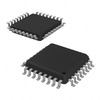Manufacturer Part Number
MC9S08GB60CFU
Manufacturer
NXP Semiconductors
Introduction
The MC9S08GB60CFU is an 8-bit microcontroller designed for embedded applications, part of NXP's S08 series.
Product Features and Performance
Core Processor: S08, 8-Bit
Operating Speed: 40MHz
Connectivity options include I2C, SCI, and SPI
Peripherals include Low Voltage Detect (LVD), Power-On Reset (POR), Pulse Width Modulation (PWM), and Watchdog Timer (WDT)
Features 56 I/O pins for versatile interfacing
Program Memory Size of 60KB FLASH
RAM Size of 4KB
Internal Oscillator for simplified clock generation
Data Converters: 8 channels of 10-bit Analog-to-Digital Converter (A/D)
Operates over a wide voltage range of 1.8V to 3.6V
Product Advantages
Large program memory and sufficient RAM for complex applications
Multiple connectivity and peripheral options support extensive functionalities
The internal oscillator reduces the need for external components
Low power consumption suitable for battery-powered devices
Wide operating temperature range making it ideal for industrial applications
Key Technical Parameters
Core Size: 8-Bit
Speed: 40MHz
Voltage Supply: 1.8V to 3.6V
Operating Temperature: -40°C to 85°C
Package: 64-LQFP
Quality and Safety Features
Includes safety features like LVD and POR ensuring reliable operation under suboptimal conditions
Comprehensive self-monitoring capabilities through the Watchdog Timer
Compatibility
SPI, I2C, and SCI interfaces ensure compatibility with a wide range of peripherals and sensors
Application Areas
Industrial Control
Automation
Consumer Electronics
Automotive applications
Product Lifecycle
The MC9S08GB60CFU is marked as Obsolete, indicating it might be nearing the end of its product lifecycle
Users should look for replacements or upgrades for new designs
Several Key Reasons to Choose This Product
High integration provides a compact solution for space-limited applications
Wide operating temperature range makes it suitable for harsh environments
The rich set of peripherals supports a wide variety of functions without additional components
Obsolescence status necessitates consideration for long-term product support and availability in legacy applications



 MC9S08GT16ACFDENXP USA Inc.IC MCU 8BIT 16KB FLASH 48QFN
MC9S08GT16ACFDENXP USA Inc.IC MCU 8BIT 16KB FLASH 48QFN MC9S08GT16ACFBENXP USA Inc.IC MCU 8BIT 16KB FLASH 44QFP
MC9S08GT16ACFBENXP USA Inc.IC MCU 8BIT 16KB FLASH 44QFP MC9S08GT16ACFCENXP USA Inc.IC MCU 8BIT 16KB FLASH 32QFN
MC9S08GT16ACFCENXP USA Inc.IC MCU 8BIT 16KB FLASH 32QFN MC9S08FL8CLCNXP USA Inc.IC MCU 8BIT 8KB FLASH 32LQFP
MC9S08FL8CLCNXP USA Inc.IC MCU 8BIT 8KB FLASH 32LQFP MC9S08GT16ACFDEFreescale SemiconductorIC MCU 8BIT 16KB FLASH 48QFN
MC9S08GT16ACFDEFreescale SemiconductorIC MCU 8BIT 16KB FLASH 48QFN MC9S08GB32CFUE-3L31RFREESC
MC9S08GB32CFUE-3L31RFREESC